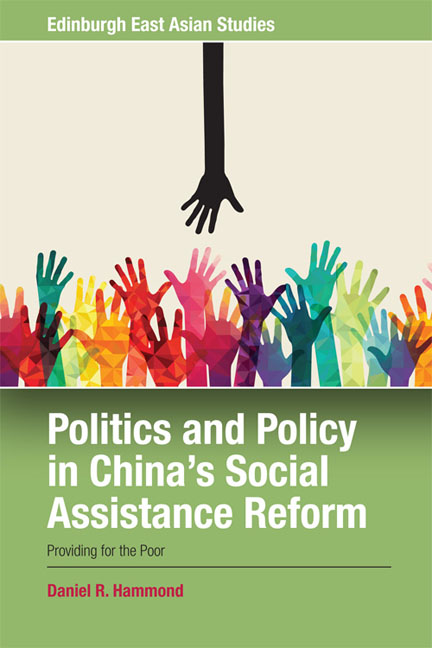Book contents
- Frontmatter
- Contents
- Acknowledgements
- Note on Chinese and Translations
- Glossary of Terms and Abbreviations
- Introduction
- 1 Historical Background to Dibao and the Question of Poverty in China
- 2 Urban Dibao: Emergence and Transition to National Policy, 1992–1999
- 3 Urban Dibao: The Resolution of Unwanted and Unintended Outcomes, 1999–2003
- 4 Rural Dibao: The Countryside and Fragmentation
- 5 Institutionalisation? Achieving Policy in a Fragmented State
- Conclusion
- Appendix: Interview List
- Bibliography
- Index
Introduction
Published online by Cambridge University Press: 18 December 2019
- Frontmatter
- Contents
- Acknowledgements
- Note on Chinese and Translations
- Glossary of Terms and Abbreviations
- Introduction
- 1 Historical Background to Dibao and the Question of Poverty in China
- 2 Urban Dibao: Emergence and Transition to National Policy, 1992–1999
- 3 Urban Dibao: The Resolution of Unwanted and Unintended Outcomes, 1999–2003
- 4 Rural Dibao: The Countryside and Fragmentation
- 5 Institutionalisation? Achieving Policy in a Fragmented State
- Conclusion
- Appendix: Interview List
- Bibliography
- Index
Summary
Introduction
The People's Republic of China's (China or PRC hereafter) transformation since 1978 has been dramatic and far reaching. The headline grabbing growth achieved under the leadership of the Chinese Communist Party (CCP) has transformed people's lives, but it has not been without consequence. The introduction of market principles has seen the re-emergence of poverty as a policy problem in urban and rural areas. The size of China means that the scale of the challenge presented by poverty was and continues to be enormous. While the reforms have lifted hundreds of millions of Chinese out of poverty there are tens of millions who have been left behind (ADB 2004; Gustafsson and Zhong 2000; Hussain 2003; Khan and Riskin 2001, 2005; Tang 2003). One response to the issue has been the introduction of new policies to expand the scope and provision of social assistance for those most in need. The Minimum Livelihood Guarantee (MLG or dibao hereafter) system emerged during the 1990s initially providing a means tested benefit to urban residents who applied for assistance. First appearing in Shanghai in 1993, the MLG was a radical departure from traditional urban social assistance and went on to spread to a small number of cities before being officially marked for national implementation in 1997. Since 1997 the MLG has undergone significant expansion in the number of people receiving the benefit as well as large increases in scope and expenditure, and, in 2007, a rural MLG system was implemented nationally. It is a means tested, locally-administered and -financed policy which provides a household with a top-up to their income providing a minimum income guarantee. The MLG was originally designed to provide the absolute minimum that a household might require to survive and as such should not necessarily be thought of as a poverty alleviation measure. Rather the MLG was a continuation of traditional Chinese social assistance which provided those most in need with the means to survive and served the state's political aims of governing a stable society.
The MLG is important for two reasons. First, it is a radical departure in the mechanics of social assistance provision in China.
- Type
- Chapter
- Information
- Politics and Policy in China's Social Assistance ReformProviding for the Poor?, pp. 1 - 20Publisher: Edinburgh University PressPrint publication year: 2018



